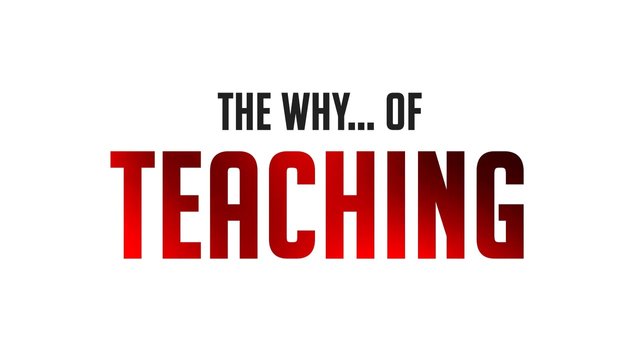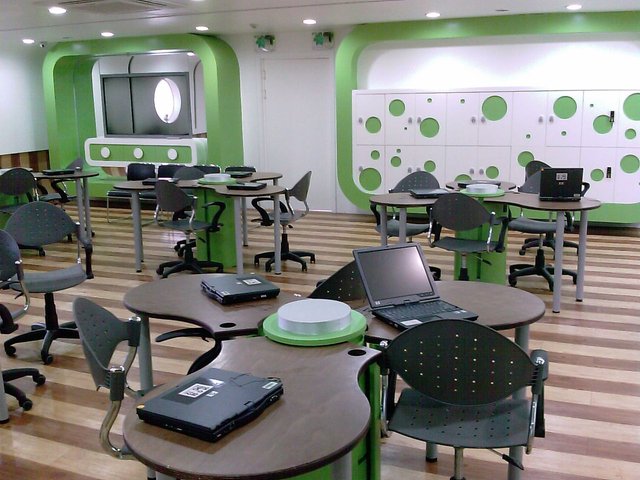Towards a Holistic Philosophy of Education

The school year is just beginning for many American schools, and students and teachers alike are looking forward to a fresh start. While the rhythm of the school year brings some consistency, the landscape of education continues to shift as teachers and administrators seek out the most effective ways that students learn.
One to one initiatives; Understanding by Design; curriculum mapping; online learning; formative assessments; college prep; educational augmented reality; STEM and STEAM; AP programs... the list can go on for quite a while.
There is a constant push for new and innovative methods of instruction and classroom design, in the hopes that a "silver bullet" might be found that solves our educational woes. The aim is always to reach those students that seem unreachable - because of educational expectations, learning styles, learning disabilities, or even just apathy. Teaching has always been more art than technical craft, trying to determine the best way to bring content to today's students. And what may work for one student may not work for another. How should teachers and school administrators position themselves to cultivate effective instruction?

The Latest and Greatest
Many teachers feel the need to stay on education's "cutting edge," bringing new ideas into their classrooms. An article written by Pearson Education - one of the biggest international educational publishers - suggests some of the latest pushes one may find in today's classrooms:
"6 exciting education trends for 2017" - Pearson Education
- Students as consumers and creators of digital content, supplementing the model of traditional textbooks and physical curriculum.
- Deconstructing the traditional classroom with "anywhere, anytime learning." Hybrid programs that combine traditional instruction with online learning communities.
- An emphasis on formative assessments to help track along the way what students have learned, allowing teachers to adjust instruction to students' measured abilities.
- Growth of PLCs (professional learning communties) emphasizing the need for teachers to continue their own learning. Encouraging achievements through "microcredentialing, digital badging, and Open Educational Resources."
- Drawing from the workplace models of the Silicon Valley: promoting collaboration, employee positivity, and an atmosphere of welcome and self-worth.
- Improving the home/school connection, bringing parents into the learning process. Teachers and parents partnered together.
In reading ideas like these, it is easy to get excited for the possibilities opened up. Here are new things to try that might make the classroom even better! Like a cat chasing a laser pointer we jump from one thing to the next, dazzled by novelty, believing that we will finally catch what we seek: a quality educational program.
Yet just like the laser's ephemeral red dot, we find that what we hope for never quite comes to reality. Our desires slip through our fingers and we never actually come to a place of solidness. These exciting new trends eventually lose their newness and we go off in search of something to replace them.
This is not to say that the above suggestions given by Pearson (or any other educational initiative) do not have value. I have in fact used several of the above ideas in my own classroom and have also encouraged them in others' classrooms as an educational administrator. The real issue here is not the programs themselves, but the foundation on which they are built. If we don't know why we choose to implement these programs, they will fail before they begin.
I have worked in education for over 12 years, and have come to the belief that the core of all successful teaching comes from the interior landscape of those that lead the classroom and campus. No program can find success without one with strong character at the lead; a rigorous program will not cover over the weaknesses of a poor teacher.
With that said, here are the qualities that must first be represented before any discussion of new educational programs. Though each are mentioned in brief here, I will be writing a full-length article on each one in the upcoming days.

A Holistic Philosophy of Education
Education begins and ends with people, and true education will always take place within the context of community. Education is far more than the acquisition of certain skills and discrete facts, but is a transformational process built on mutual trust, cooperation, and whole-heartedness - for both the teacher and the student.
If community is at the center of education, our core philosophy must reflect this, and all programs must be built on the foundation of these principles.
Uniqueness of the individual must be foremost - Any philosophical foundation that begins with personhood must acknowledge the uniqueness of each person. In education this applies to both the teacher and the student. Every teacher has distinct skill sets, internal motivations, temperament and personality, and passions for life. All of these things will be reflected directly or indirectly in the classroom. Similarly, every student is coming into the classroom with different ambitions, personal interests, learning styles, and strengths and weaknesses. Good education happens when instruction honors the myriad of personalities in the classroom, finding a means of learning that allows each person to be who they are, all while stretching them to be who they are meant to be.
As a teacher, YOU are the curriculum - This is a logical next step from the above statement, as the uniqueness of each teacher plays a primary role in the direction for the classroom. In a general sense, the curriculum is what drives instruction in the classroom. Most tend to connect this to textbooks, assessments, technology, classroom space, etc. But the most important part of learning is connected to the teachers themselves. A teacher and student could be sitting alone in a blank and empty room, and learning could still happen. Everything put into classrooms that we call "curriculum" are really only tools to help foster this educational relationship between student and teacher.
Critical thinking and creativity are far more important than discrete knowledge - Again, highlighting the personhood of teacher and student, the main goal of the classroom should not be the acquisition of knowledge, but the growth of learning itself. Yes, we believe as a culture that there are important events in our nations history that students should know and learn in a social studies class. Yet even more important is learning to think like a historian - how to read primary sources, understand bias, compare and contrast, make necessary conclusions, and connect historical thinking to other interdisciplinary studies. If a student knows how to take information in - analyze it, interpret it, connect it, and make new understandings - they can do so with any concept of any period of time.
(Positive) discipline is integral to education - Many tend to feel that discipline is something that "gets in the way" of education, something that must be "handled" and "dealt with" in order to get on with what is really important. This perspective misses out on significant opportunities. More generally speaking, discipline is really the enforcement of community expectations. When those expectations are broken, there are actions taken to help correct and reinforce the classroom's expectations again. Whether something small (like talking in class) or large (a fight between students), each incident becomes an opportunity for growth and personal involvement. While this growth may not be directly related to the class' current content, it will have an indirect but vital impact on the classroom's atmosphere.
To know is to love - This is the most important aspect of an educational philosophy, and is the culmination of each of the above points. Unfortunately, our cultural view of knowledge is often tied to the acquisition of information, points of data that are accumulated to give understanding within specific areas of study. The more understandings and skills one has within a field, the more one will be able to put it to efficient use. Knowledge is something that is controlled and manipulated. But in a personal philosophy of education, knowledge is ultimately what brings us into community with one another. Understanding leads to purpose and direction, putting knowledge in to action - there is something we must do with this knowledge. And that action leads to relationship and community with others. We do not act within a vacuum. And if one is to work effectively within a community, one must learn to love - to work with others cooperatively, with patience, perseverance, and best intentions for others.
As you can see, there is a lot to unpack here. It is my hope that each of these will be expounded on at length in upcoming posts. But for now, this is just a teaser!

Come join us on Discord! https://discord.gg/7qyarFD
Thanks for the resteem! I appreciate your efforts in seeking out educational posts across Steemit. Keep up the good work!
Current pedagogy is a mess. I would say it has been for at least the last 75+ years. I am not sure what the best approach is, but a holistic one makes sense. Like you say education is not about acquiring skills, that is suppose to be realm of training. This distinction has been lost ever since the breakdown of classical learning for the more uniform Prussian methodology.
A pragmatic way out would be through unschooling/homeschooling or just general self-education. It's easier now than ever before. One problem though is credentialism has taken over society, so we judge the merit of ones learning based on what degrees or awards they have achieved. Perhaps a crypto solution is possible and may even be facilitated with Steem and how Steemit works.
Yes, I like that distinction: training vs. teaching. One can learn facts and skills in a training session, and even be able to use them efficiently. However, teaching has connotations of wisdom and discernment. Training is goal-oriented with a very specific result in mind. Teaching is process-oriented, helping students become better learners.
In my mind, an educational revolution will never happen top-down, through legislations and policies. A cultural paradigm shift is needed, and this will happen over time as educators, one by one, take their own personal initiative on their campuses.
Thats insightful. Education has still long way to go to make it more holistic and truly learning.
Congratulations @abishai! You have completed some achievement on Steemit and have been rewarded with new badge(s) :
Click on any badge to view your own Board of Honor on SteemitBoard.
For more information about SteemitBoard, click here
If you no longer want to receive notifications, reply to this comment with the word
STOP